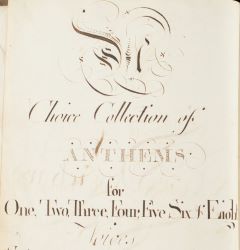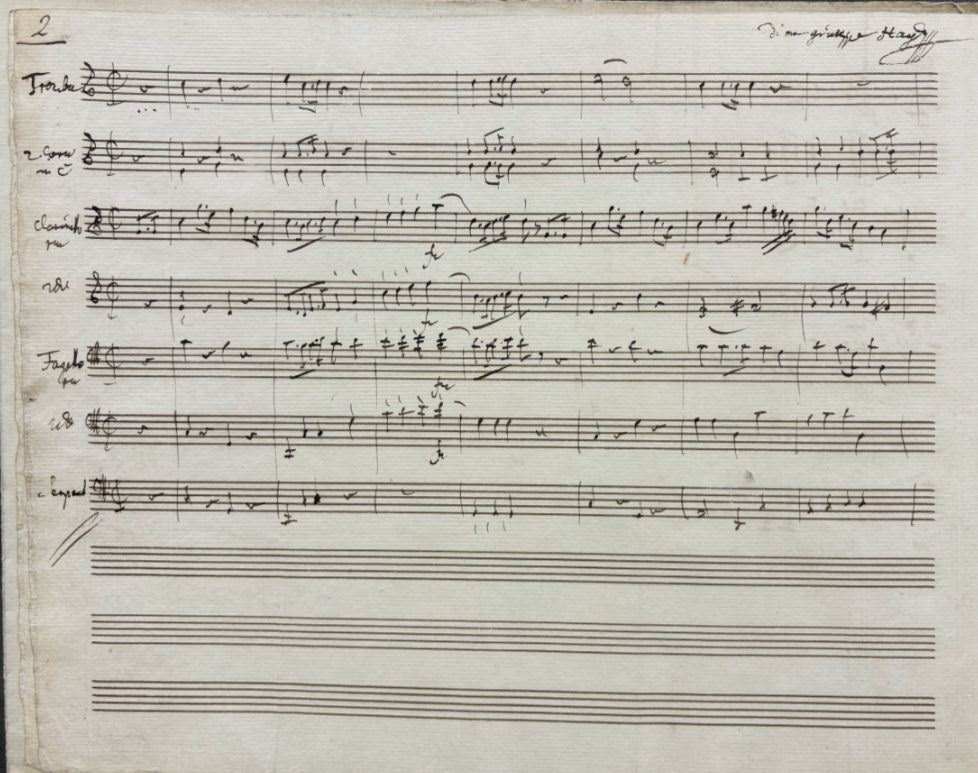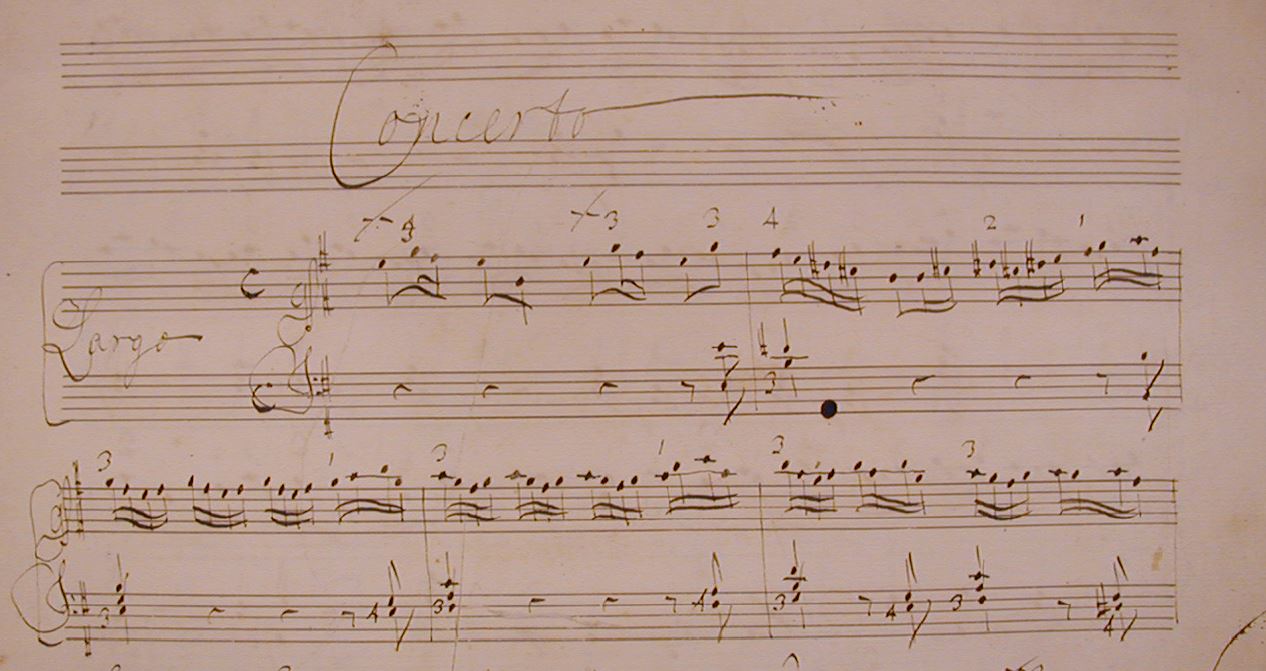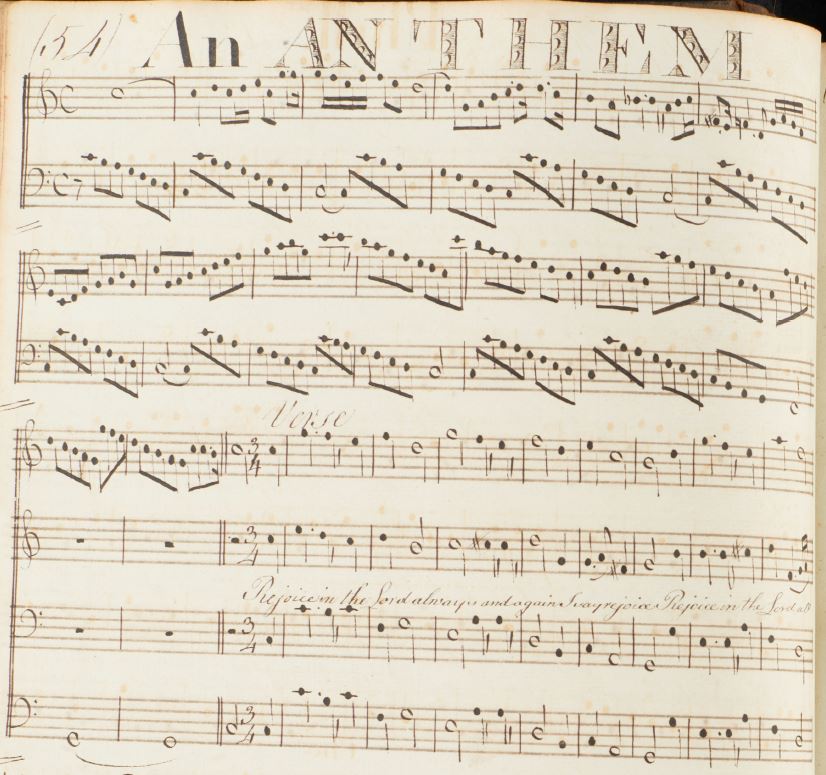Musical discoveries from English local archives
Stephen Rose
Friday, October 4, 2024

The previous RISM news item introduced the project Music, Heritage, Place: Unlocking the Musical Collections of England’s County Record Offices, led by Royal Holloway, University of London. This article introduces some of the sources recently discovered or catalogued in the project, to show the range of musical heritage found in these local archives.
Derbyshire Record Office (GB-MTdro) holds a unique complex of sources for Joseph Haydn’s Derbyshire Marches for military band, Hob. VIII:1–2. Although these sources were known to the editors of the Johann Haydn Werke, our RISM cataloguing has enabled new insights into them. The two Haydn marches were commissioned in 1794/5 by Sir Henry Harpur (1763–1819), 7th Baronet of Calke Abbey, for the cavalry regiment he had raised in Derbyshire. The manuscripts include Haydn’s autograph score of the March in C major Hob. VIII:2 (RISM Catalog | RISM Online) and sources in the hand of Haydn’s copyist Johann Elssler with corrections by the composer, including a score of the March in E flat major Hob. VIII:1 (RISM Catalog | RISM Online), incomplete sets of parts for both marches (RISM Catalog | RISM Online) and piano arrangements of both (RISM Catalog | RISM Online). The source complex also contains five exemplars of the printed edition published by Harpur (RISM Catalog | RISM Online). Autographs of the marches in E flat and C also survive in the Hungarian National Library (RISM Catalog | RISM Online) and Eisenstadt respectively, but the Derbyshire sources show Haydn’s revisions of these compositions and how he carefully corrected Elssler’s copies.

Joseph Haydn, March in C major Hob. VIII:2, autograph score, fol.1r. Derbyshire Record Office, D2375/F/H/1/6/23/5. Reproduced by kind permission of the National Trust. For further information and licensing enquiries, please contact National Trust Images at images@nationaltrust.org.uk. This image must not be reproduced without their permission.
Derbyshire Record Office also holds letters from the Harpur family relating to the commissioning, composition and reception of Haydn’s Derbyshire Marches, and a handwritten catalogue of Henry Harpur’s private music library, of which these sources were a part. In 1994 the Haydn manuscripts were accepted by the UK government from the Harpur-Crewe family in lieu of inheritance tax; ownership of these sources was transferred to the National Trust, which allocated them to Derbyshire Record Office. This is an example of how English local archives contain sources from high-profile composers that complement and enrich the insights available from manuscripts in major research libraries.
Musical life in England’s rural counties was in close contact with the latest trends in London. So-called ‘persons of quality’ in the 18th century typically spent the social season in London and the rest of the year in their country residences. Musical sources often reflect this movement between London and the countryside. The music book of Mary Orlebar (1730–1821), preserved in Bedfordshire Archives (RISM Catalog | RISM Online), was copied around 1745 by the London organist Philip Hart. The account books of the Orlebar family record their life divided between London and Bedfordshire, including Mary’s lessons with Hart. Her music book, copied in the distinctive florid hand of Hart with copious ornamentation and fingering, includes keyboard arrangements of concertos by Albinoni, Corelli and Vivaldi, and of an overture used in a Handel pasticcio of 1730. There are also songs associated with London’s pleasure gardens. Orlebar’s book shows the repertory available to a 15-year-old girl learning the harpsichord in the 1740s, including concerto arrangements requiring high levels of technical ability.

Tomaso Albinoni, Concerto in E minor, op.2 no.4 arranged for keyboard. Mary Orlebar’s Music Book, fol.1r. Copied by Philip Hart. Bedfordshire Archives OR2183, by kind permission.
Many music manuscripts in local archives stem from the collections of parish churches. Richard Poole’s anthem book (1792) was copied in the parish of Withington, Gloucestershire but survives in the parish collection of Kingsclere, Hampshire (RISM Catalog | RISM Online). The elegant calligraphy and elaborate title (Choice Collection of Anthems…) suggest Poole may have intended this manuscript for printed publication. It contains 149 anthems by composers including London musicians such as Henry Purcell, John Blow and William Boyce, and regional composers such as William Knapp, Joseph Key and Capel Bond. It also contains works by Poole himself plus a collaborative composition, O sing unto the Lord a new song (RISM Catalog | RISM Online) ‘by several authors of the Musical Society…composed for the General Thanksgiving for his present Majesty’s Recovery’ [King George III], with sections attributed to six (presumably amateur) composers. The anthems by Purcell would more usually be found in the repertory of cathedral choirs, but Poole adapted them for parish singers by putting the voice-parts in the G clefs preferred by amateur musicians, rather than the C clefs usually found in Purcell sources. Further research may show how Poole was able to obtain copies of cathedral-level repertory in his Gloucestershire village.

Henry Purcell, Rejoice in the Lord alway, adapted into G clefs for a parish choir. Richard Poole Anthem Book, p.54. Hampshire Archives, 90M72/PZ33. Digitisation and cataloguing funded by Hampshire Archives Trust.
Insights on these sources arise from the work of our team of researchers including Andrew Frampton, Caro Lesemann-Elliott and Stephanie Carter, plus student helpers including Lizzy Buckle and Sophie Currie. This work again shows the value of the RISM database in showing the connections between continental European composers and the musical sources preserved in English local archives. We look forward to sharing more discoveries with the RISM community over the next two years.
Image above: Richard Poole Anthem Book, title page. Hampshire Archives, 90M72/PZ33. Digitisation and cataloguing funded by Hampshire Archives Trust.
Share Tweet EmailCategory: Library collections

